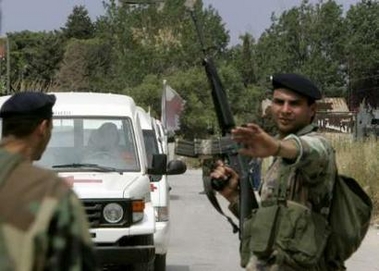DAY 4 – May 23rd
 BEIRUT (AFP) by Nayla Razzouk – Lebanon told Islamic militants holed up in a Palestinian refugee camp on Wednesday to surrender or else, as a bomb wounded five people outside the capital and a militant was shot dead in the northern city of Tripoli.
BEIRUT (AFP) by Nayla Razzouk – Lebanon told Islamic militants holed up in a Palestinian refugee camp on Wednesday to surrender or else, as a bomb wounded five people outside the capital and a militant was shot dead in the northern city of Tripoli.
The ultimatum followed three days of fierce fighting between the army and terrorist groups. "The army will not negotiate with Fatah al-Islam, which has two choices: either surrender or the army will take the military option," Defence Minister Elias Murr said in an interview on Arabic satellite channel Al-Arabiya.
"The army has made its military preparations, which I will not disclose," said the minister without mentioning any deadline.He spoke as thousands of refugees streamed out of the battered Nahr al-Bared camp near Tripoli.Wednesday night’s explosion rocked the predominantly Druze town of Aley east of the capital, wounding five people, a security official said.It was the third blast in the Beirut area in four days. The first in the Christian district of Ashrafiyeh on Sunday night killed one woman. The second was in Verdun, a predominately Sunni Muslim quarter, and wounded 10 people.
Fatah al-Islam initially claimed those two bombings, but later denied them.
In Tripoli, a Fatah al-Islam militant was shot dead by security forces on Wednesday when he tried to throw a hand grenade at them after being cornered in the Bab al-Tabbaneh neighbourhood, police said.
Prime Minister Fuad Siniora said his government’s goal was to "eliminate the Fatah al-Islam phenomenon" after the bloodiest internal fighting in Lebanon since the 1975-1990 war.
Inside Nahr al-Bared the streets were littered with rubble and buildings were pockmarked with bullet holes and shrapnel.
The International Committee of the Red Cross (ICRC) estimated that between 13,000 and 15,000 refugees have left since the fighting halted on Tuesday. Nobody is being allowed in, sparking fears of further fighting.
"Despite the deep wounds, the army remains… the guarantor of the united national will, and will not be lenient with the gangs of terrorists," the army command said.
The Al-Qaeda-inspired Sunni militia said it would keep a ceasefire it declared on Tuesday but was ready to fight again.
"We respect the truce, but we will not surrender. If we are attacked, we will fight until the last drop of blood," spokesman Abu Salim told AFP.
The fighting had stoked fears it could spread to other Palestinian camps in Lebanon and further worsen sectarian and political tensions.
Murr said that this was not a war between the Lebanese and Palestinians, and that the army "has always been and will always be committed to preserving the lives of Palestinian civilians" in the camp.
Under a four-decade-old arrangement, the camps remain outside the authority of the government, leaving security to armed Palestinian factions.
Palestine Liberation Organisation representative in Lebanon Abbas Ziki said the PLO would not object if the army sent troops into Nahr al-Bared.
"Whatever Lebanon decides or considers its higher interests, we support," he said.
An Islamist group in Lebanon’s largest Palestinian refugee camp of Ein el-Helweh warned in an Internet statement it would avenge "heinous crimes" committed by the Lebanese army during the fighting.
"Mujahedeen in Ein el-Helweh" also warned Palestinian president Mahmud Abbas not to commit "any military act in coordination with the infidel Lebanese army against the mujahedeen of Fatah al-Islam, because we will strongly strike against them in Ein el-Helweh camp," according to a transcript provided by the US-based SITE Institute, which monitors terrorist websites.
Firefights around Nahr al-Bared and in Tripoli killed 68 people in the three days of fighting, including 30 troops, 19 Palestinian refugees, 18 militants and one Lebanese civilian.
Murr said the authorities had intelligence that "between 50 and 60 Fatah al-Islam fighters have been killed."
A security official said the corpse of Fatah al-Islam’s number two was found on Wednesday, identifying him only as Boumedien.
Relief agencies voiced continuing concern as men, women and children poured out of Nahr al-Bared towards the nearby Beddawi refugee camp or Tripoli, Lebanon’s second largest city.
Aid agencies and volunteers battled to help the displaced, who recounted scenes of disaster in Nahr al-Bared where people were without food, water or electricity.
"We are providing relief aid to the thousands of refugees who have sought refuge in our schools and centres in Beddawi and Tripoli," said Hoda Samra, spokeswoman for UN Palestinian refugee agency UNRWA.
Virginia de la Guardia of the ICRC later said 200 tonnes of food would be delivered to Beddawi and Nahr al-Bared on Thursday.
The emergence of Fatah al-Islam has underscored the fragile security situation in Lebanon, where Siniora is grappling with a months-old political crisis and a string of attacks against critics of former power broker Syria
"Lebanon is doing the right thing to try to protect its population, to assert its sovereignty and so we are very supportive of the Siniora government and what it is trying to do," Secretary of State Rice said
Lebanese officials have accused Fatah al-Islam, whose leader is a Palestinian said to have been linked to the slain Al-Qaeda in Iraq
Syria denies any ties with the Islamists and said the unrest appeared to be a bid to prod the UN Security Council into setting up an international tribunal to try suspects in the murder of Lebanese ex-premier Rafiq Hariri.
Siniora’s administration has been paralysed by feuding between opponents of Damascus and pro-Syrian factions including the Shiite militant group Hezbollah, largely over the creation of the court.



